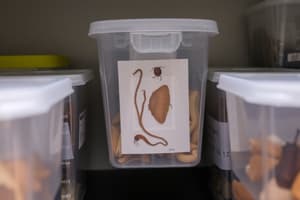Podcast
Questions and Answers
What is the recommended storage temperature for unpreserved urine and stool specimens?
What is the recommended storage temperature for unpreserved urine and stool specimens?
Refrigerate (4oC)
At what temperature should specimens collected for the recovery of Neisseria gonorrhoeae be stored?
At what temperature should specimens collected for the recovery of Neisseria gonorrhoeae be stored?
Room (ambient) temperature (22oC)
What is the recommended storage temperature for cerebrospinal fluid (CSF) specimens?
What is the recommended storage temperature for cerebrospinal fluid (CSF) specimens?
Body temperature (37oC)
Which specimens should be stored in the freezer at -20oC?
Which specimens should be stored in the freezer at -20oC?
What type of specimens should be stored at -70oC for long-term storage?
What type of specimens should be stored at -70oC for long-term storage?
Which body fluids are recommended to be stored at room temperature (22oC)?
Which body fluids are recommended to be stored at room temperature (22oC)?
What are the minimum information required on a specimen label?
What are the minimum information required on a specimen label?
What details should be included on a specimen requisition form?
What details should be included on a specimen requisition form?
Which specimens fall under level 1 priority for processing in the laboratory?
Which specimens fall under level 1 priority for processing in the laboratory?
What is the importance of prompt processing of specimens in the laboratory?
What is the importance of prompt processing of specimens in the laboratory?
Why is it crucial to provide detailed information on specimen labels and requisition forms?
Why is it crucial to provide detailed information on specimen labels and requisition forms?
What are the risks associated with delaying the processing of level 1 specimens?
What are the risks associated with delaying the processing of level 1 specimens?
Flashcards are hidden until you start studying
Study Notes
Storage Temperature for Specimens
- Unpreserved urine and stool specimens should be stored at room temperature (22°C) or refrigerated at 4°C.
- Specimens collected for the recovery of Neisseria gonorrhoeae should be stored at 35-37°C to promote bacterial growth.
- Cerebrospinal fluid (CSF) specimens should be stored at room temperature (22°C) or refrigerated at 4°C.
Freezer Storage
- Specimens that require freezing should be stored in the freezer at -20°C.
- Long-term storage of specimens (e.g. for research purposes) requires storage at -70°C.
Room Temperature Storage
- Body fluids that can be stored at room temperature (22°C) include urine, stool, and CSF.
Specimen Labeling and Requisition Forms
- Minimum information required on a specimen label: patient's name, identification number, specimen type, and collection date.
- A specimen requisition form should include the patient's name, identification number, test requested, collection date, and any relevant clinical information.
Priority Specimens
- Level 1 priority specimens for processing in the laboratory include those that are unstable or require rapid processing, such as blood cultures and CSF specimens.
- Prompt processing of specimens in the laboratory is crucial to ensure accurate results, prevent degradation, and provide timely medical intervention.
Importance of Detailed Information
- Providing detailed information on specimen labels and requisition forms is crucial to ensure accurate testing, prevent errors, and maintain patient safety.
- Delaying the processing of level 1 specimens can lead to inaccurate results, delayed diagnosis, and compromised patient outcomes.
Studying That Suits You
Use AI to generate personalized quizzes and flashcards to suit your learning preferences.



